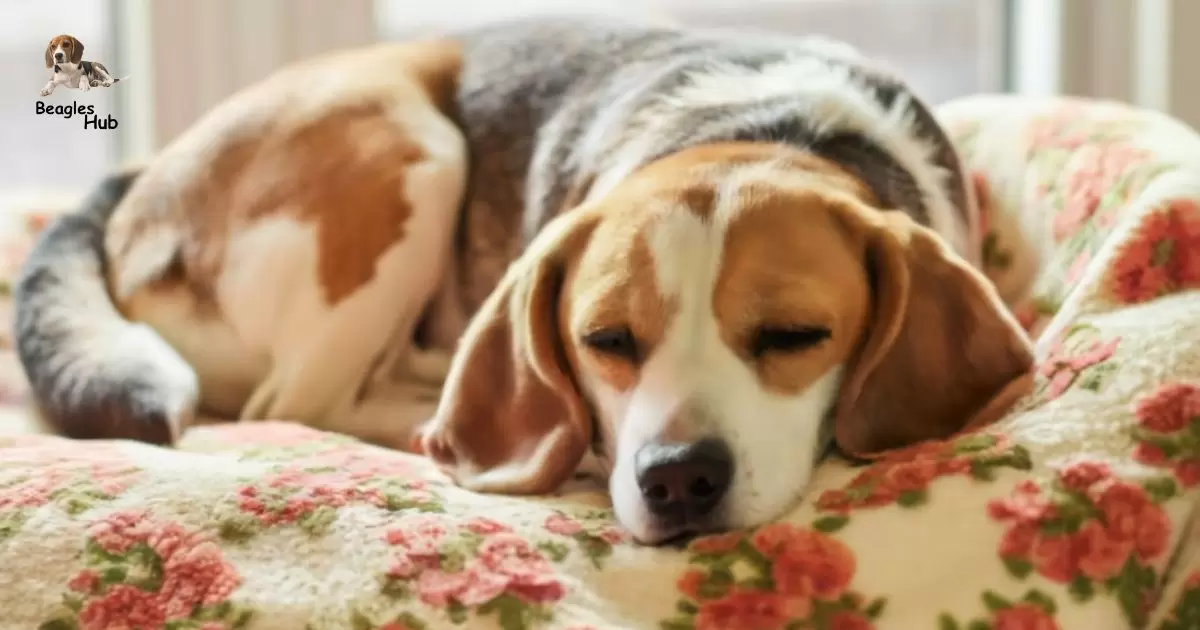Beagles are friendly, energetic dogs that are also known to be big sleepers. As hunting breeds, beagles have a higher energy level and stamina compared to other dog breeds. However, they also require ample rest and sleep to recharge their bodies.
This blog post will dive deeper into beagle sleep patterns, how much sleep beagles need on a daily basis based on their age, factors that impact beagle sleep, and tips for ensuring your furry companion gets enough rest.
| Factor | Category | Average Hours of Sleep per Day | Key Details |
|---|---|---|---|
| Age | Puppies (8 weeks – 6 months) | 16-18 hours | Require more sleep for growth and development. Sleep in short naps. |
| Adult Beagles (6 months – 7 years) | 12-14 hours | Consolidate sleep at night with one daily nap. | |
| Senior Beagles (7+ years) | 14-16 hours | May sleep more due to health issues. Could wake periodically at night. | |
| Activity Level | More Active | Potentially more (12-15 hours) | Higher activity burns more calories requiring additional rest. |
| Less Active | Potentially less (11-13 hours) | ||
| Size | Smaller (<20 lbs) | Potentially more (12-14 hours) | Higher metabolism for their size expends more energy. |
| Larger (>25 lbs) | Potentially less (11-13 hours) | ||
| Health Issues | Present | Varies | Medical problems can disrupt sleep or cause fatigue. |
| No Issues | 12-18 hours range | Based on age and other factors. |
Understanding Beagle Sleep
Beagles exhibit distinct sleep patterns that are influenced by various factors such as their age, size, activity level and overall health. Being scent hounds, beagles also have an extraordinary sense of smell and can stay focused on a smell for extended periods of time. However, this comes at the cost of high energy expenditure that needs to be replenished with sufficient sleep. Proper sleep allows beagles to restore energy reserves and recharge physically as well as mentally for daily activities.
How Many Hours Do Beagles Sleep?
On average, adult beagles need around 12 to 14 hours of sleep per day. This includes short naps in addition to longer periods of nighttime sleep. Puppies, on the other hand, require closer to 18 hours of sleep a day as they are still growing and developing. Even senior beagles tend to sleep more than adult dogs, often in the range of 14 to 16 hours daily. The exact number of hours can vary based on individual needs, but most beagles will sleep a significant part of the 24-hour period.
Beagle’s Physical Characteristics
Beagles are medium-small sized dogs that weigh between 18-30 pounds as adults. Though not the biggest dogs, beagles have a high-energy hunting drive. Their short coats require less calories to maintain compared to larger, furrier dog breeds. However, despite their compact size, beagles use up a lot of energy during play,sniffing, exploring and other activities. Their muscular build also means beagles have a higher metabolic rate compared to toy dog breeds. All of these physical traits contribute to beagles needing more rest and sleep to recover from expending high amounts of energy throughout the day.
Why Do Beagles Sleep So Much?
There are a few key reasons why beagles tend to be bigger snoozers compared to other dogs:
- Hunting instinct: As scent hounds, beagles have been bred over centuries to follow animal scents for long periods and track prey over large distances. This high-energy, focused work requires ample subsequent rest.
- Metabolism: Beagles have a higher metabolism compared to less active dogs. More calories and nutrients are burned daily, creating a need for additional sleep to restore energy balance in the body.
- Size: Despite weighing under 30 pounds, beagles are compact bundles of energy. Their small stature allows them to move quickly and explore actively but also tires them out faster requiring rest.
- Enriched senses: Beagles have an extraordinary sense of smell allowing them to stay focused on scents for prolonged time. However, highly developed sensory abilities come at an energetic cost necessitating more sleep.
Factors that Affect How Long Do Beagles Sleep
There are a few factors that impact how much sleep individual beagles require on a daily basis:
Age
As with humans, younger and older beagles tend to sleep more than those in their prime adult years. Puppies need up to 18 hours, while senior dogs closer to 14-16 hours of rest daily.
Activity Levels
More active beagles that enjoy chasing, playing, exploration will naturally burn more calories and require additional rest. Less energetic individuals may sleep slightly less.
Size
In general, smaller beagles under 20 pounds will need a bit more sleep than larger dogs over 25 pounds due to having a higher metabolic rate in relation to their size. However, size alone does not determine sleep needs.
How Much Do Beagles Sleep By Age?
Understanding how a beagle’s sleep requirement changes with age can help pet parents provide sufficient rest and care. Here’s a breakdown:
Beagle Puppies (8 weeks to 6 months)
- Sleep Needed: 16-18 hours per day
- Sleep in short naps spread throughout the day
Adult Beagles (6 months to 7 years)
- Sleep Needed: 12-14 hours per day
- Sleep consolidated at night with one nap during the day
Senior Beagles (7+ years)
- Sleep Needed: 14-16 hours per day
- Sleep in longer stretches but may have instances of waking at night
How Much Sleep for a Beagle (7+ Years)
To ensure your furry friend’s overall health and well-being, most beagles should be getting:
Senior Beagle Sleep
As beagles get older, they tend to sleep more each day and can display changes in sleep-wake cycles. Senior dogs may exhibit:
- Longer nighttime sleep of 8-10 hours
- Increased daytime napping of 2-4 hours
- More fragmented sleep with brief nighttime waking
- Difficulty falling back asleep after nighttime arousals
- Changes in quality of sleep (restless, lighter sleep)
- Signs of aging like joint pain could disrupt nightly rest
- Increased medical issues may cause daytime sleepiness
Keep a close eye on sleeping patterns of older beagles and consult the vet about any new changes from normal routines.
How much sleep do adult Beagles need?
Adult beagles from 6 months to 7 years of age generally need:
Adult Beagle Sleep
- 7-9 hours of uninterrupted nighttime sleep
- 1-2 hours of naptime spread during the day
- Total 12-14 hours of sleep daily
Maintaining a consistent sleep-wake routine helps adult beagles feel rested. Ensure factors like exercise, diet and calorie intake match your dog’s energy levels. Monitor for signs of excessive daytime sleepiness which could indicate an underlying health issue.
How much sleep do Beagle puppies need?
Beagle puppies under 6 months require copious amounts of rest as they grow and develop rapidly. Getting ample quality sleep is key to their physical and mental wellbeing.
Why Do Beagle Puppies Need So Much Sleep?
- Puppies burn high calories supporting growth & organ maturation
- Muscles & bones develop while asleep rebuilding themselves
- Brain development occurs mainly during sleep
- Immune system strengthens with adequate rest
Beagle Puppy Sleep Patterns
- Puppies sleep 16-18 hours per day in short frequent naps
- Wakeful periods last 1-2 hours before needing a nap
- Bladders are small so sleeping & elimination schedules coincide
- Quality sleep repairs body & readies them for play/learning
Consistency is key for puppy sleep. Follow meals with a nap to aid digestion. Use crate training to help with potty training and scheduled sleep/wake cycles.
What If Your Beagle Is Sleeping Too Much?
Most beagles will sleep within the normal range. However, excessive daytime sleepiness could indicate an underlying cause:
- Senior health issues: Arthritis, dental disease, cognitive issues
- Obesity or poor diet: Leads to low energy, lethargy
- Disease: Hypothyroidism, Cushing’s, infections needing veterinary attention
- Anxiety/depression: Changes to environment, separation distress
- Parasites: Fleas, intestinal worms sapping vitality
Consult your vet if you notice abnormal sleeping patterns like sleeping much more than usual during the day or night. Early intervention helps address potential medical issues.
Top 4 Ways to Ensure That Your Beagle Gets Enough Sleep
1. Routine
Establish a predictable daily schedule including set times for meals, play, exercise and bedtime. Consistency reduces stress and promotes healthy sleep-wake cycles.
2. Diet
Feed a balanced, high-quality kibble tailored to your dog’s size and activity level. Overfeeding or unhealthy meals could contribute to obesity and its related lethargy.
2. Sleeping Area
Provide a comfortable dog bed in a quiet, draft-free room away from disturbances. Consider white noise or calming pheromone diffusers to ease anxiety.
3. Exercise
Daily physical activity through walks, playtime, or fetch helps tire out beagles naturally. But avoid vigorous exercise 2-3 hours before bedtime when trying to wind down.
Do Beagles Sleep More Than Other Dogs?
When compared to other breeds, beagles do exhibit higher sleep requirements on average. However, sleep needs can vary significantly between individual dogs based on:
- Size: Smaller breeds sleep more than large/giant dogs due to having a higher metabolic rate.
- Energy levels: Low stamina dogs sleep more than active herding and sporting breeds.
- Coat type: Furrier northern breeds require extra rest versus short-coated hounds and terriers.
- Age: Puppies and seniors sleep the most out of all dogs.
That said, on the whole beagles tend towards the higher end of the sleep spectrum for many breeds. Their hunting heritage and compact muscular frame pair with medium size to earn them a reputation as big snoozers. But all dogs have unique sleep habits influenced by multiple genes and lifestyle factors.
How to Sleep train your Beagle?
Sleep training a beagle puppy or new rescue instills healthy sleep habits from a young age. Here is a 5 step routine you can start:
Step 1: Exercise
Beagles require plenty of physical and mental stimulation daily to drain excess energy before bed. Play fetch, go for walks and do training sessions outdoors.
Step 2: Meals
Feed on a predictable schedule, last meal finishing 2-3 hours before bedtime to avoid nighttime disruptions.
Step 3: Toilet
Let your beagle go potty right before bed and after waking to avoid accidents. Stick to schedule.
Step 4: Playtime
Keep play active and engaging until 30 mins before bed then transition to calmer indoor activities.
Step 5: Greet your Beagle
Give your beagle attention when first greeting after being apart, but try to avoid over-excitement close to bedtime. Use a gentle touch and calm voice.
Consistency is key. With time and positive reinforcement, beagles form healthy sleeping patterns.
Health and Sleep in Beagles
Getting the right amount of high-quality sleep is vital for supporting a beagle’s physical and mental wellbeing:
- Sleep aids restorative processes like muscle/tissue repair, growth and development.
- Growth hormone is released in adequate amounts during deep sleep facilitating healing.
- Cognitive processes are enhanced as the brain organizes information learned during the day.
- Metabolism regulates and energy reserves replenish to maintain a healthy weight.
- Immune system function improves with sufficient rest replenishing white blood cells.
- Stress levels remain balanced when sleep-wake homeostasis occurs smoothly.
Overall, fully rested beagles tend to be in better health with fewer medical issues emerging. Consult a vet if your dog’s sleep quality or patterns seem disrupted.
Exercise and Beagle Sleep
Daily exercise is key to tiring out beagle’s energy levels to ensure sound sleep at night:
- Long walks allow beagles to sniff, explore, mark territory burning calories naturally.
- Fetch and play in confined spaces indoors or outdoors are great for mental and physical stimulation.
- Backyard romps released pent up energy through running, toys and interaction.
- Structured activities channel working breeds’ intelligence through sports, agility and training.
The goal is moderate exercise for at least 30-60 minutes split into two shorter sessions if needed. Too little leaves beagles restless. Too much close to bed may hyper-stimulate instead of calming. Regular workouts also combat obesity helping beagles enjoy better quality sleep cycles.
Beagle Sleep Habits
Gaining a deeper understanding of beagles’ natural sleeping patterns and needs fosters their well-being:
Sleep Patterns of Beagles
- Diurnal, sleeping mostly at night like humans but also daytime naps
- Cycle between REM (dreaming), non-REM deep sleep and lighter sleep
- Adapt sleep-wake routine consistent with household & outdoor schedule
Giving Your Beagle a Good Night Sleep
- Keep evening low-key without overstimulation
- Use crate/bed, keep room cool, dark and quiet
- Establish calming predinner & bedtime routines
Beagle’s Favorite Sleeping Position
- On their side or back with legs outstretched, paws together
- Curled into a loose fetal position, head tucked
- Near owners, other pets for companionship and warmth
Right Amount of Sleep
- Varies by age but average 14 hours including nightly consolidated rest
- Daytime naps recover energy balancing rest-activity needs
Diet and Beagle Sleep
What you feed your beagle can directly impact their quality and quantity of sleep:
- High protein diets keep beagles feeling fuller for longer between meals aiding restful nights.
- The right calories based on your dog’s size, age and lifestyle prevent excessive weight gain linked to sleep issues.
- Complex carbs supply steady energy avoiding crashes that disrupt sleep.
- A balanced vitamin/mineral profile supports the body’s daily functions and restorative processes.
- Hydrated kibble prevents urinary problems disturbing rest. Offer plenty fresh water throughout the day.
- Avoid giving table scraps, which can cause indigestion when eaten close to bed.
A nutritious, consistent diet tailored to your beagle’s needs promotes overall wellness including natural sleep cycles.
Beagle Breed Specifics and Sleep
Beagles display certain genetic traits related to their sleeping patterns:
- Originally bred as hunting hounds, beagles have a strong instinct to track scents requiring stamina.
- Their compact size gives a large surface area to volume ratio expending more calories proportional to their weight.
- Highly developed olfactory senses and intelligence take focus and energy to use, tiring easily.
- Beagles are social creatures attaching tightly to their human pack, which soothes anxiety allowing restful sleep.
- Their friendly nature enjoys human companionship keeping beagles from excessive solitary behaviors wearing them out faster.
Understanding their innate sleep needs as a breed helps pet parents provide ideal care, exercise and habits facilitating sufficient restorative rest.
Is it normal for my beagle to sleep a lot?
It’s quite normal for beagles to sleep significantly more than other breeds. As long as your dog is getting:
- 12-14 hours of sleep per day as an adult
- 16-18 hours for puppies up to 6 months
- 14-16 hours or more as a senior dog
And displays no other unusual health symptoms, the amount of sleep is typical beagle behavior. Ensure adequate exercise to tire them out followed by comfortable sleeping quarters with their family.
Consult your vet if amount of sleep has recently increased excessively or they seem lethargic or depressed when awake as well. Otherwise, snoozing beagles are simply experiencing life to the lazy rhythm nature gave them!
Frequently asked questions
Why does my beagle sleep so much during the day?
Possible reasons include insufficient exercise, illness, senior age, stress/anxiety or obesity. Ensure daily activity and consult your vet if issue persists.
How can I help my beagle relax before bedtime?
Keep evening low-key without overt excitement. Offer a puzzle toy, calming music, gentle brushing or light training to unwind your pup mentally.
My beagle refuses to sleep through the night, any tips?
Establish a consistent bedtime routine. Check for medical issues or try crate training. Puppies typically outgrow this with maturity and bladder control.
Is it okay to wake my sleeping beagle for playtime?
Avoid disturbing natural naps which are important for their mental and physical restoration. However, you can rouse them gently if need a short interaction then allow restful sleep again.
My beagle is always sleeping, is he depressed?
Monitor for other signs like refusal of favorite things, lack of appetite or responsiveness. Beagles do love sleeping but discuss any concerns with your vet who can examine for potential physical or emotional issues.
Conclusion
Beagles have earned their reputation as big sleepers thanks to both nature and nurture. Understanding their breed-specific sleep patterns and instincts aids responsible pet ownership. By providing physical exercise, mental stimulation, comfortable quarters, routine and a balanced diet – beagle guardians help their furry friends get the quality rest that supports peak health, happiness and longevity. Consistency paired with veterinary care results in well adjusted and well-rested companion beagles.







